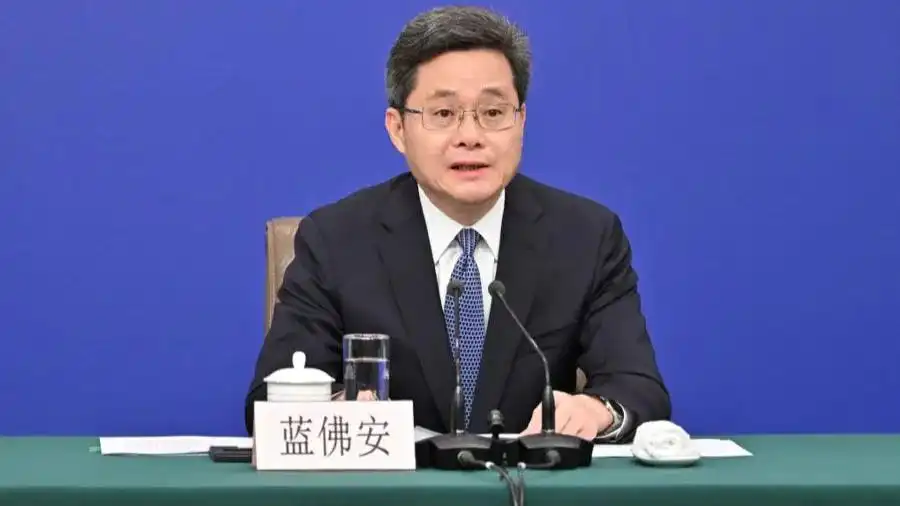The fiscal department strictly controls the "three public" expenditures and uses the saved money for people's livelihood
#** At 3 pm on March 6, the Second Session of the 14th National People's Congress held a press conference in the Press Conference Hall of the Media Center. Zheng Zhajie, Director of the National Development and Reform Commission, Lan Fo 'an, Minister of Finance, and Wang Wentao, Minister of Commerce, Pan Gongsheng, President of the People's Bank of China, and Wu Qing, Chairman of the China Securities Regulatory Commission, answered questions from Chinese and foreign journalists on issues related to development and reform, fiscal budget, commerce, financial securities and other issues. **
A reporter from China Daily asked: Every year, it talks about the tight life of party and government agencies. How effective is it? This year, I proposed to get used to living a tight life. Is it time to cover my wallet and not spend money?
** **
**  **
**
Finance Minister Lan Fo 'an said that party and government agencies live a tight life. This is a clear requirement of the Party Central Committee. Governments at all levels must take the lead in implementing it and do all undertakings diligently and diligently. As the saying goes, only by careful calculation can we keep oil and salt. If the party and government agencies spend less money, we can arrange more money for people's livelihood undertakings. Of course, party and government agencies live a tight life, not by holding tight wallets and not spending money, but by spending what should be spent. Provinces and provinces should be "generous with big money and stingy with little money" and concentrate financial resources to do big things.
Lan Fo 'an said that in recent years, the financial department has strictly implemented the requirements for living a tight life, which can be summarized mainly in the following three aspects:
First, efforts should be made to reduce administrative operating costs and increase efforts to ensure people's livelihood. 2023年中央本级“三公”经费支出预算,比疫情前的2019年下降了20%。同期,财政民生支出保持较快增长。2023年,各级财政用于教育等重点民生领域的支出,比2019年增长了25.5%。
The second is to rationally arrange central department expenditures and increase transfer payments to local governments. 在切实保障部门履职的基础上,中央部门带头过紧日子,2020年—2022年中央部门支出连续负增长,2023年也只略增了0.8%,把节约下来的钱用于支持地方保障民生、促进发展。2019—2023年,中央对地方转移支付从7.44万亿元,增加到10.29万亿元,首次超过10万亿元,增长了38%。
The third is to strictly control general expenditures and ensure the implementation of major national strategic tasks. 比如,2018—2023年,全国财政科技支出从8327亿元,增长到10823亿元,增长了30%。2024年中央本级科技支出继续加力,增幅达到10%,更好支持科技自立自强。
This year's government work report once again emphasizes that governments at all levels must get used to living tight lives, further highlighting that this is not a temporary need, but a long-term solution. The financial department will implement the work mainly from three aspects:
** The first is the idea of living a tight life. ** Advocate simplicity, practice strict economy, and avoid luxury, regard doing all undertakings thrifty and frugal as a long-term policy, and effectively implement it in the entire process and all aspects of financial work.
The second is to grasp the implementation of living a tight life. 我们将持续从严从紧控制“三公”经费管理,严格执行会议差旅、资产配置、政府采购等方面的制度规定,把过紧日子的要求落到实处。强化预算的约束,推动精简不必要的节庆、论坛和展会等,及时收回使用结余闲置的资金,把更多的“真金白银”用于发展的紧要处、民生的急需上。
The third is to strengthen supervision of living a tight life. 2023年,我们加大财会监督力度,严肃查处了使用财政资金搞“形象工程”等违规行为。下一步,我们将继续强化监督惩处,坚决杜绝讲排场、比阔气,坚决防止搞“政绩工程”、“面子工程”。
** Learn about today's press conference
